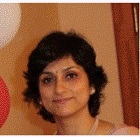
Dr. Meera Chadha. — Tribune photo
Vijay Mohan
Tribune News Service
Chandigarh, October 13
Dust, which is present omnisciently, could become one of the ways to reduce the effect of nuclear weapons. This has been propounded in a research paper by a woman scientist from the Netaji Subhas Institute of Technology, New Delhi.
In her study, Dr Meera Chadha has shown for the first time—through mathematical modelling—that the deadly effects of nuclear weapons can be partially mitigated or reduced with the help of dust particles.
The study, published in the Proceedings of Royal Society A, London, illustrates the reduction in the energy released and the damage radius from an intense explosion (nuclear explosion in particular) by the introduction of dust particles.
It has shown how the blast waves from the explosion decayed in the process.
Dr Chadha, along with another scientist, J Jena studied the impact created by the introduction of up to five per cent dust particles in enhancing the decay of blast waves produced by a nuclear explosion.
The enhancements in decay caused by varying the quantity of dust were studied. The blast energy and damage radius are found to decrease with time with an increase in the dust parameters.
A statement issued by the Ministry fo Science and Technology on Tuesday said that returned to the science mainstream after a hiatus of one year due to domestic reasons.
The Women Scientist Scheme fellowship of the Department of Science and Technology provides opportunities to women scientists and technologists who had a break in their career but desire to return to the mainstream.
Such a break is common among Indian women who prioritise family over their career due to various circumstances, which are usually typical to the gender.
The Women Scientist Scheme (WOS-A) fellowship of the Department of Science & Technology (DST) provides opportunities to women scientists and technologists who had a break in their career but desired to return to the mainstream.
She utilised the break in her career to studying explosions and the possible effects of dust particles on them.
WOS-A gave her the flexibility of time and resources in terms of equipment and funds to carry out her research.
“During my Ph.D., I studied about shock waves and how dust particles contribute to reducing their strength. I came across a book, Science towards Spirituality, in which former President, Late Dr Abdul Kalam, was asked whether science could create a ‘cool bomb’ that can defuse or deactivate the deadly atom bomb. This got me thinking,” said Dr Chadha in a statement issued by the ministry while explaining the trigger behind her research.
Join Whatsapp Channel of The Tribune for latest updates.



























